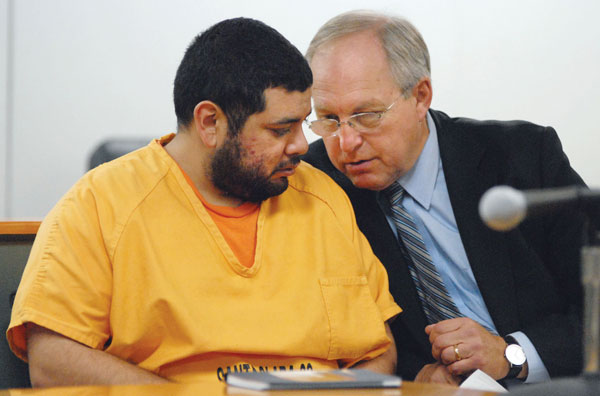After two doctors said Pete Valdez III was mentally unfit for
trial, a judge has ruled to let a jury decide whether the man
accused of trying to shoot a Gilroy police officer in the face is
competent. If the jury sides with the doctors, Valdez III could
dodge a life sentence and spend three years in a state
hospital.
After two doctors said Pete Valdez III was mentally unfit for trial, a judge has ruled to let a jury decide whether the man accused of trying to shoot a Gilroy police officer in the face is competent. If the jury sides with the doctors, Valdez III could dodge a life sentence and spend three years in a state hospital.
During the trial in Morgan Hill, which has yet to be scheduled, the jury will decide only if Valdez III is competent to stand trial, and not whether he is guilty of any alleged crimes, according to lawyers. Two court-appointed doctors, who will likely testify under oath before the jury, have both already found the defendant incompetent, according to court records. The public cannot view those physician reports per doctor-patient confidentiality laws, but the state evidence code includes an exception that denies this privilege during a criminal proceeding, such as a trial.
Given the doctors’ opinions, it seems Deputy District Attorney Cindy Hendrickson faces an uphill battle.
“We might not prevail,” she said.
Yet, the attorney also pointed out the burden of proof in such a trial rests on the defense. The opposite occurs in a normal criminal trial, which requires prosecutors to prove guilt beyond a reasonable doubt.
“This is a serious case with serious charges, and we just want to make sure that the right thing happens. If Mr. Valdez is not competent, then we want to have a jury have a chance to say he is competent,” Hendrickson said.
The deputy district attorney also raised questions about the timing of questions surrounding Valdez III’s competency. The issue came up in May, when Superior Court Judge David Cena appointed a doctor to review Valdez III’s readiness for trial after the defendant’s private attorney, Berndt Ingo Brauer, requested the review. In response, the district attorney’s office requested the second report that eventually concurred with the first. All this followed a lengthy preliminary hearing stemming from Valdez III’s November 2007 arrest. During that process, neither side questioned the defendant’s mental capacity, Hendrickson said.
“The case was proceeding for a while before the issue of competency ever came up,” Hendrickson said. “The defense certainly has an interest in making (Valdez III) appear not competent.”
Upon hearing Cena’s decision to send the case to a jury for review, the portly defendant’s eyes watered as his face bunched up and turned red. Then, Valdez shook his head slowly while Brauer whispered to him. Behind them in the gallery sat Valdez III’s father – former long-time Gilroy City Councilman Pete Valdez Jr. – who watched his son attentively.
Brauer could not be reached for comment afterward and has generally declined to speak the last few months, but Hendrickson said it is more than likely he will call to the stand one of the court-appointed doctors to testify on his client’s behalf. Proving Valdez III’s incompetence requires the divulging of certain medical information, the specifics of which remain sealed at this point, Hendrickson said. She also pointed to a state evidence code that circumstantially denies doctor-patient privilege.
“They will call any doctors and other witnesses, and after each witness they call, we have the opportunity to cross examine,” she said.
If the jury finds Valdez III incompetent, he will temporarily avoid trial. Rather than spending his life in prison – which would result if convicted of the alleged crimes because he has 10 prior convictions – Valdez III could spend up to three years in a state hospital. At the end of three years – or if a mental health doctor discharges Valdez III prior to that – the defendant will have a hearing to see if he should face charges again.
“The goal is to get a person restored to competency, and if they’re restored, then they can come back and the criminal proceedings get reinstated and the case continues on,” Hendrickson said. If, however, a defendant is still incompetent after three years, that case fizzles out more often than not, though the charges never fully disappear, said Hendrickson and Amy Cornell, the public information officer for the District Attorney’s Office.
Valdez III faces charges of attempted murder and three other felonies in connection with the pre-dawn incident the morning of Nov. 15, 2007. Gilroy Officer John Ballard noticed Valdez III bicycling without a headlight and tried to stop the portly man before he took off. Valdez III ditched the bike a few blocks later and fled on foot. Ballard caught up with Valdez III and tackled the suspect in a dark dirt lot near the intersection of Eighth and Church streets, according to court documents.
The two men struggled for a few moments before Valdez III took out a .25-caliber semiautomatic handgun loaded with seven hollow-point bullets. With his face in the dirt and Ballard – a 12-year officer – on top trying to restrain him, Valdez III pointed the gun at Ballard’s face and pulled the trigger multiple times, according to court documents. But the gun malfunctioned because two bullets clogged the chamber.
Eventually Ballard and a back-up officer cuffed Valdez III with the help of an electronic stun gun and several blows to the head, officers said. The defense has also raised questions about potential video footage of the incident, but police cameras were either absent or not working, and the city has experienced technical problems retrieving digital footage.









